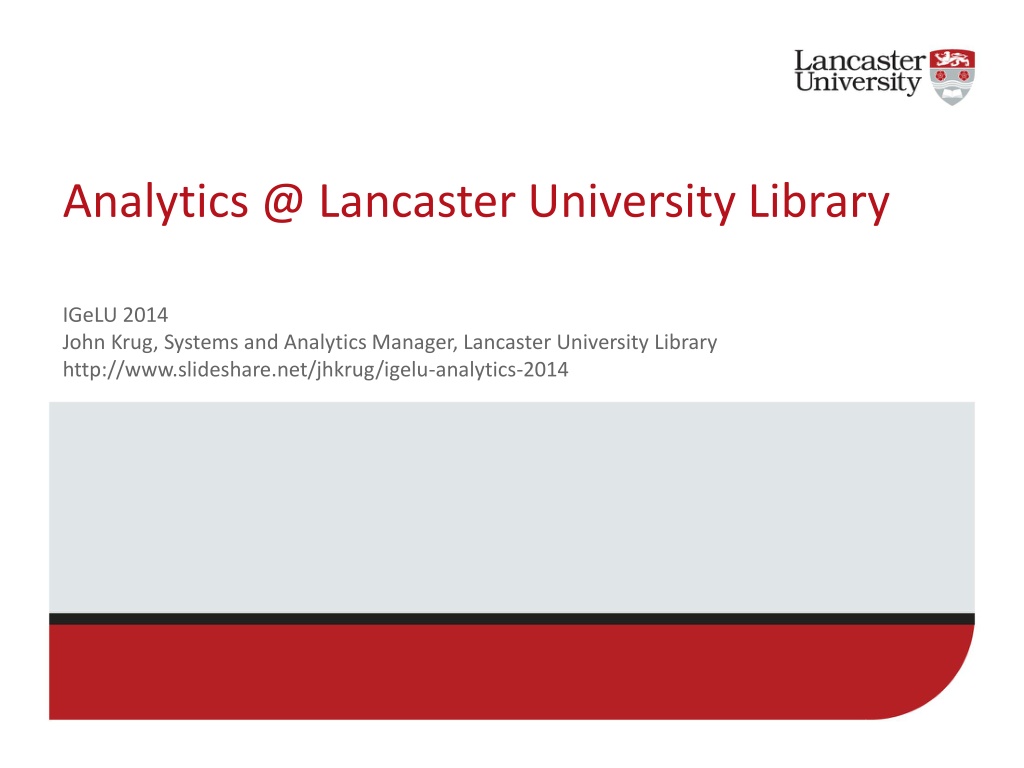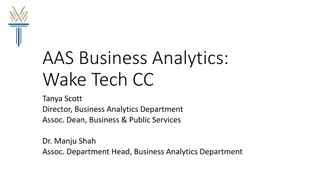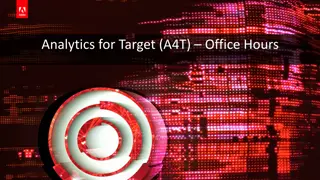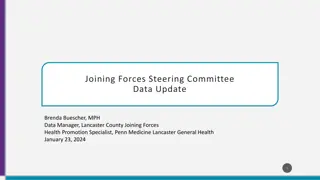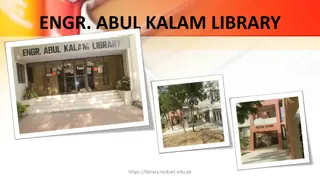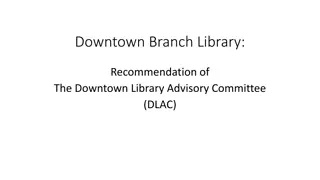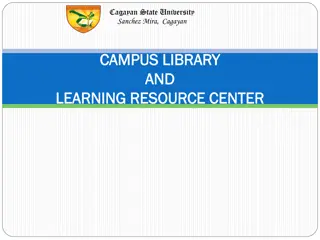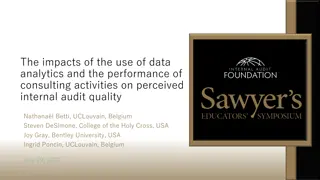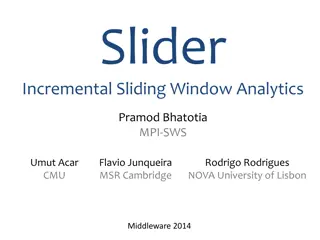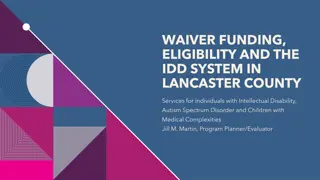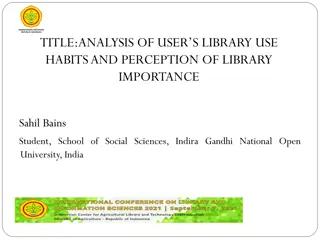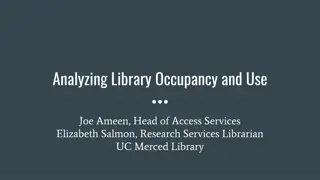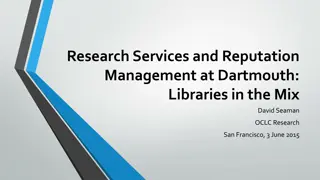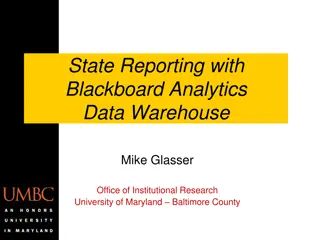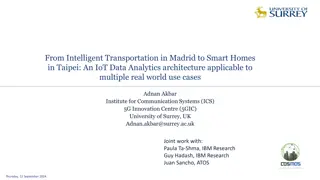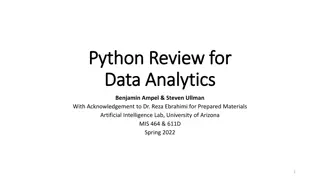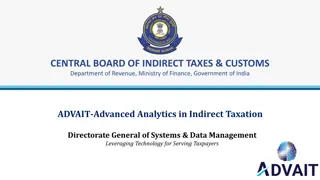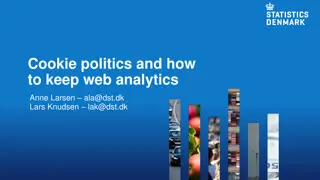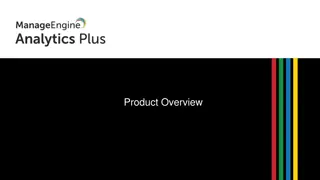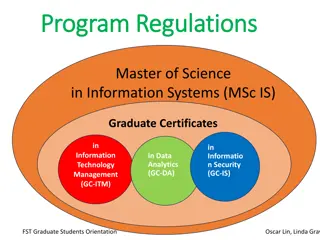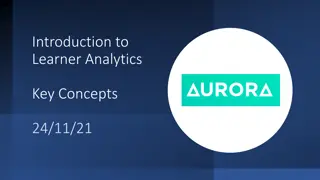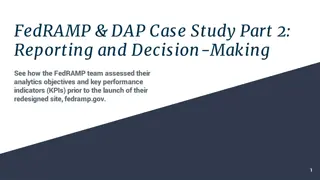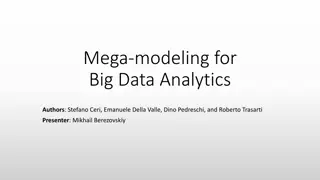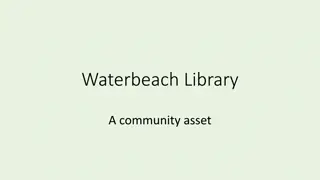Implementing Library Analytics at Lancaster University
Lancaster University Library, through the leadership of John Krug, Systems and Analytics Manager, has embraced analytics to enhance operations and decision-making. With the implementation of Alma and the development of analytics dashboards, the library is utilizing data from various sources such as Aleph and Ezproxy to improve services and efficiency. Projects and challenges in data visualization, ETL processes, and data extraction are being navigated with a focus on gaining insights to better serve the university community.
Uploaded on Oct 02, 2024 | 0 Views
Download Presentation

Please find below an Image/Link to download the presentation.
The content on the website is provided AS IS for your information and personal use only. It may not be sold, licensed, or shared on other websites without obtaining consent from the author. Download presentation by click this link. If you encounter any issues during the download, it is possible that the publisher has removed the file from their server.
E N D
Presentation Transcript
Analytics @ Lancaster University Library IGeLU 2014 John Krug, Systems and Analytics Manager, Lancaster University Library http://www.slideshare.net/jhkrug/igelu-analytics-2014
Lancaster University, the Library and Alma We are in Lancaster in the UK North West. ~ 12,000 FTE students, ~ 2300 FTE Staff Library has 55 FTE staff, building refurbishment in progress University aims to be 10, 100 Research, Teaching, Engagement Global outlook with partnerships in Malaysia, India, Pakistan and a new Ghana campus Alma implemented January 2013 as an early adopter. I am Systems and Analytics Manager, at LUL since 2002 to implement Aleph systems background, not library How can library analytics help?
Alma Analytics reporting and dashboards Following implementation of Alma, analytics dashboards rapidly developed for common reporting tasks Ongoing work in this area, refining existing and developing new reports
Fun with BLISS B Floor 9AZ (B) 347 lines of this!
Projects & Challenges LDIV Library Data, Information & Visualisation ETL experiments done using PostgresQL and Python Data from Aleph, Alma, Ezproxy, etc. Smaller projects: e.g. Re-shelving performance required to use Alma Analytics returns data along with the number of trolleys re-shelved daily. Challenges Infrastructure, Skills, time Lots of new skills/knowledge needed for Analytics. For us : Alma analytics (OBIEE), python, Django, postgres, Tableau, nginx, openresty, lua, json, xml, xsl, statistics, data preparation, ETL, etc, etc, etc
Alma analytics data extraction Requires using a SOAP API (thankfully a RESTful API is now available for Analytics) SOAP support for python not very good, much better with REST. Currently using the suds python library with a few bug fixes for compression, & encoding, etc. A script get_analytics invokes the required report, manages collection of multiple gets if the data is large and produces a single XML file result. Needs porting from SOAP to REST. Data extraction from Alma Analytics is straight forward, especially with REST
Data from other places Ezproxy logs Enquiry/exit desk query statistics Re-shelving performance data Shibboleth logs, hopefully soon. We are dependent on central IT services Library building usage counts Library PC usage statistics JUSP & USTAT aggregate usage data University faculty and department data Social networking New Alma Analytics subject areas, especially uResolver data
Gaps in the electronic resource picture Currently we have aggregate data from JUSP, USTAT Partial off campus picture from ezproxy, but web orientated rather than resource Really want the data from Shibboleth and uResolver Why the demand for such low level data about individuals?
The library and learner analytics Learner analytics a growth field Driven by a mass of data from VLEs and MOOCs . and libraries Student satisfaction & retention Intervention(?) if low(library borrowing) & low(eresource access) & high(rate of near late or late submissions) & low_to_middling(grades) then do_something() The library can t do all that, but the university could/can Library can provide data
The library as data provider LAMP Library Analytics & Metrics Project from JISC http://jisclamp.mimas.ac.uk We will be exporting loan and anonymised student data for use by LAMP. They are experimenting with dashboards and applications Prototype application later this year. Overlap with our own project LDIV The Library API For use by analytics projects within the university Planning office, Student Services and others
The Library API Built using openresty, nginx, lua Restful like API interface e.g. Retrieve physical loans for a patron GET http://lib-ldiv.lancs.ac.uk:8080/ploans/0010215?start=45&number=1&format=xml (or json) <?xml version="1.0" encoding="UTF-8"?> <response> <record> <call_no>AZKF.S75 (H)</call_no> <loan_date>2014-07-10 15:44:00</loan_date> <num_renewals>0</num_renewals> <bor_status>03</bor_status> <rowid>3212</rowid> <returned_date>2014-08-15 10:16:00</returned_date> <collection>MAIN</collection> <rownum>1</rownum> <material>BOOK</material> <patron>b3ea5253dd4877c94fa9fac9</patron> <item_status>01</item_status> <call_no_2>B Floor Red Zone</call_no_2> <bor_type>34</bor_type> <key>000473908000010-200208151016173</key> <due_date>2015-06-19 19:00:00</due_date> </record> </response> [{ "rownum": 1, "key": "000473908000010-200208151016173", "patron": "b3ea5253dd4877c94fa9fac9", "loan_date": "2014-07-10 15:44:00", "due_date": "2015-06-19 19:00:00", "returned_date": "2014-08-15 10:16:00", "item_status": "01", "num_renewals": 0, "material": "BOOK", "bor_status": "03", "bor_type": "34", "call_no": "AZKF.S75 (H)", "call_no_2": "B Floor Red Zone", "collection": "MAIN", "rowid": 3212 }]
How does it work? Nginx configuration maps REST url to database query GET http://lib-ldiv.lancs.ac.uk:8080/ploans/0010215?start=45&number=1&format=xml location ~ /ploans/(?<patron>\w+) { ## collect and/or set default parameters rewrite ^ /ploans_paged/$patron:$start:$nrows.$fmt; } location ~ /ploans_paged/(?<patron>\w+):(?<start>\d+):(?<nrows>\d+)\.json { postgres_pass database; rds_json on; postgres_query HEAD GET " select * from ploans where patron = $patron and row >= $start and row < $start + $nrows"; }
Proxy for making Alma Analytics API requests e.g. Analytics report which produces nginx configuration location /aa/patron_count { set $b "api-na.hosted.exlibri lytics/reports"; set $p "path=%2Fshared%2FLancas tron_count"; set $k "apikey=l7xx6c0b1f6188514e388cb361dea3795e73"; proxy_pass https://$b?$p&$k; } So users of our API can get data directly from Alma Analytics and we manage the interface they use and shield them from any API changes at Ex Libris.
Re-thinking approaches Requirements workshops Application development Data provider via API interfaces RDF/SPARQL capability LDIV Library Data, Information and Visualisation Still experimenting Imported data from ezproxy logs, GeoIP databases, student data, primo logs, a small amount of Alma data Really need Shibboleth and uResolver data Tableau as the dashboard to these data sets
Preliminary results More at http://public.tableausoftware.com/profile/john.krug#!/
First UK Analytics SIG meeting Oct 14 following EPUG-UKI AGM Questions?
